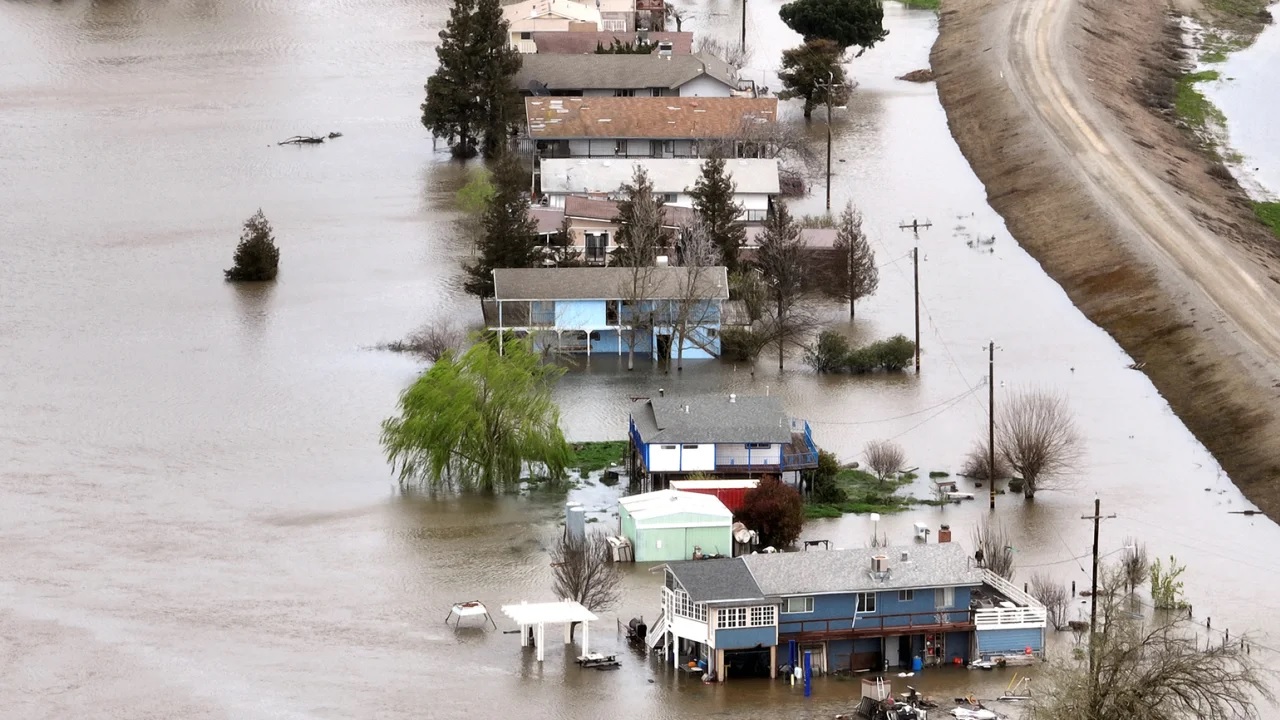(CNN) — After enduring powerful storms and devastating flooding, California is bracing for the arrival of the twelfth atmospheric river, which is expected to bring another round of heavy snow and rain to the state.
The latest storms brought moisture to California on Sunday, battering the state with strong winds and dumping more rain and snow on the region before they are expected to move inland on Monday.
Homes are partially underwater after heavy rains caused the San Joaquin River to overflow its banks in Manteca, California on March 19, 2023.
Thousands of people were under evacuation orders Sunday in two small Central California cities, Alback and Allensworth, as officials warned roads could become impassable and isolate residents, the Tulare County Sheriff’s Office said. First responders from dozens of agencies, including the California National Guard, arrived Sunday afternoon to help evacuate residents; A familiar sight in the flood-hit state this winter.
“The devastation is indescribable,” Brandon Mendonza, a Tulare County farmer, told CNN affiliate KFSN. “The water keeps coming, and it’s still a long way off.”
The next atmospheric river, primarily targeting Southern California, is expected to be colder than the last, bringing strong winds, downpours, mountain snow and a high risk of flooding on Tuesday. According to the National Weather Service, the soil in the so-called Golden State is highly saturated from last week’s storm.
Although not predicted to be as powerful as atmospheric rivers in previous weeks, the system is expected to bring 1 to 3 inches of rain to low elevations through Thursday and 2 to 4 inches to the southern California foothills. Arizona could also get 3 inches of rain.
Strong winds are also a concern. According to the weather service, winds up to 130 km/h could bring down trees and power lines south of California’s central coast.
The #Atmospheric river Hawaii’s northwest is beautiful yet powerful. It will arrive in SoCal Tuesday and bring heavy rain to the lowlands through Wednesday with heavy snow in parts of the mountains. Strong winds are likely at times, and there is a possibility of flooding in low-lying areas. #CAwx pic.twitter.com/IrgSwQbiNl
— NWS San Diego (@NWSSanDiego) March 19, 2023
High wind advisories have been issued for Tuesday and Wednesday for Southern California, including Los Angeles.
In the Sierra Nevada and Southern California mountain ranges, snow could add up to several inches to some high ground and travel could be dangerous in the coming days.
Winter storm watches have already been issued for the Sierra Nevada, with an additional 12 to 48 inches of snow possible late Monday through Wednesday afternoon. The San Bernardino Mountains are under a winter storm watch, with snowfall expected to reach up to 120 centimeters through Wednesday and wind gusts of up to 136 km/h.
Kristen Vogt and her dog Rue walk through floodwaters to return to her home after the San Joaquin River flooded in Monteca, California on March 19, 2023. (Credit: Fred Greaves/Reuters)
This winter, California has been hit by 11 different atmospheric rivers, long, narrow streams of moisture-rich air that can carry thousands of miles like a fire hose. While the storms have upended the lives of many in the state, damaging homes and forcing evacuations, they have also contributed to a dent in the state’s historic drought.
Atmospheric River just last week Daily rainfall broke records in Los Angeles, Santa Barbara and Santa Maria.
The Southern California Water Board has received as much rain Emergency rescue operations were suspended due to the drought For more than 7 million people.
Severe drought in California has halved from the previous week, now covering 8% of the state, down from 80.6% three months ago, according to the U.S. Drought Monitor. About one-third of the state is in partial drought.
An unusually wet winter — combined with recent storms — lifted California’s exceptional and extreme drought for the first time since 2020, according to the National Oceanic and Atmospheric Administration (NOAA).
“Moderate and exceptional drought coverage across the United States is the lowest since August 2020, and may continue to improve or end completely across California and the Great Basin,” NOAA forecasters said.
Snowmelt is expected to further improve drought conditions across much of the western United States in the coming months, according to NOAA. But that could mean more flooding.
“Approximately 44% of the United States is at risk of flooding this spring,” said Ed Clark, director of NOAA’s National Water Center. “California’s Historic Snowfall Combines with Spring Rains, Increases Potential for Spring Flooding.”
— CNN’s Rachel Ramirez contributed to this report.





